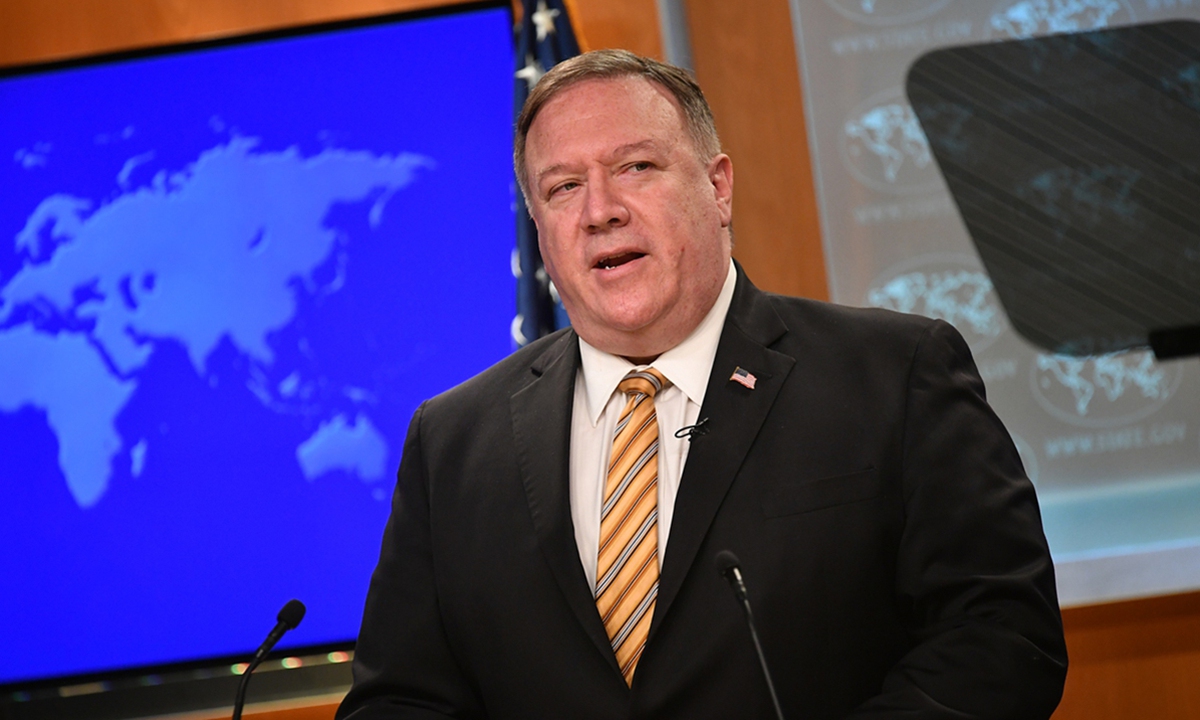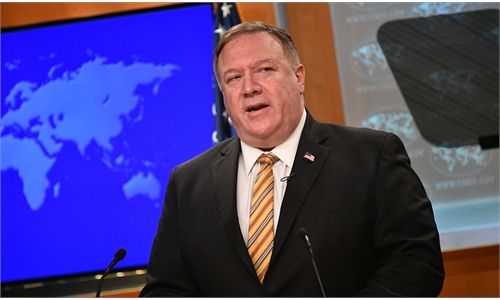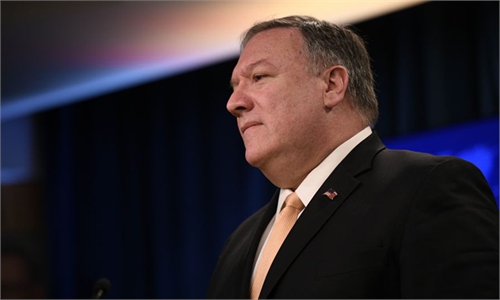
US Secretary of State Mike Pompeo File photo: AFP
As US Secretary of State Mike Pompeo will reportedly start a trip on Sunday to visit Japan, Mongolia and South Korea, US State Department Bureau of East Asian and Pacific Affairs Assistant Secretary David Stilwell said on Friday that Pompeo will participate in a ministerial meeting in Tokyo of the Quad group of the US, Japan, Australia and India.Pompeo plans to visit China's neighboring countries in Northeast Asia, except Russia and North Korea. Its intention is clear - to solidify China's neighboring countries in a bid to balance and check China.
Two regions play a vital role for Washington to build a "global anti-China alliance." The US sees its allies in Europe significant in checking and balancing China in high tech, economy and trade. Then there's the Indo-Pacific region, especially India, Japan and Australia. A quadrilateral security dialogue, an informal strategic forum between the US and the three countries, has been formed. Furthermore, South Korea is a US ally, while the US has repeatedly wooed Mongolia in recent years. If the two China neighbors could be inclined to the US and engage in more coordination with the US, Washington will better check and balance China. Therefore, the US is devoting more energy and time to rope in these countries.
US Deputy Secretary of State Stephen Biegun said in August that the US seeks to formalize closer defense relations with India, Japan and Australia, similar to the North Atlantic Treaty Organization (NATO). Biegun claims the US wants to see Vietnam, South Korea and New Zealand participate in an expanded version of the "Quad."
US Defense Secretary Mark Esper in September reiterated the US' intention to build a NATO-like alliance in the Indo-Pacific.
Such a plan can be seen as part of the story of the Arabian Nights. The establishment of NATO had its specific conditions. Amid the Cold War, the security of European countries and the US was threatened by the Soviet Union, their common foe, instead of a mere competitor. However, the current situation in the Indo-Pacific is totally different from the Cold War. Regional countries are reluctant to take sides between China and the US. If these countries coordinate with the US in building a NATO-like military alliance in checking and balancing China, their cooperation with China in terms of economy, politics and security will decrease dramatically, which is not in line with their national interests.
It was reported that Pompeo may urge South Korea to join the "Quad" during his visit. South Korea's decision to deploy the Terminal High Altitude Area Defense in 2016 triggered strong resistance from China. Seoul would be afraid that its participation in Quad will irritate China again. Even Australia, whose ties with China have sharply deteriorated, and India, whose border tensions with China are ongoing, would be reluctant to join the alliance. If they did so, they would have to bear too many difficulties and risks, such as the sharp decrease in economic exchanges with China. Such an alliance cannot be realized. However, for political purposes, some US politicians still hope to play it as a card to pursue political gains.
US President Donald Trump and his wife Melania Trump announced they had contracted COVID-19 on Friday. The total number of infections and deaths in the US from the novel coronavirus pandemic leads the world. Against this backdrop, many are confused why the US still spares no effort in wooing China's neighboring countries to check and balance China.
China has viewed COVID-19 as a crucial issue that should be tackled immediately. However, Washington doesn't give pandemic priority. The US believes the ongoing pandemic would not affect its foreign strategy. The US even takes advantage of the pandemic to serve its strategy. For example, the US uses COVID-19 to slander China and damage China's image, and then urges other countries to be consistent with the US in their China policy. It is unsurprisingly to see Pompeo pay a visit to Northeast Asia, even if the US president was infected with the virus.
Although the US has made great efforts to woo its allies to check and balance China, its effect is limited. These countries have gradually been aware of US unreliability - breach of promises, flouting international rules, and ignoring international obligations. They cannot depend on such a country to commit to alliance obligations.
On the other hand, China has embodied its responsible image on the international stage. For example, it offers a helping hand to neighboring countries in fighting the pandemic, and willing to contribute to COVID-19 accessibility and affordability in developing countries. As a result, these countries view China's rise, competition between China and US, and the evolution of the US' role more objectively and rationally.
The author is deputy director of the Center for American Studies at Fudan University. opinion@globaltimes.com.cn


